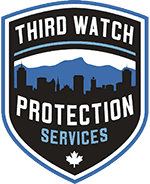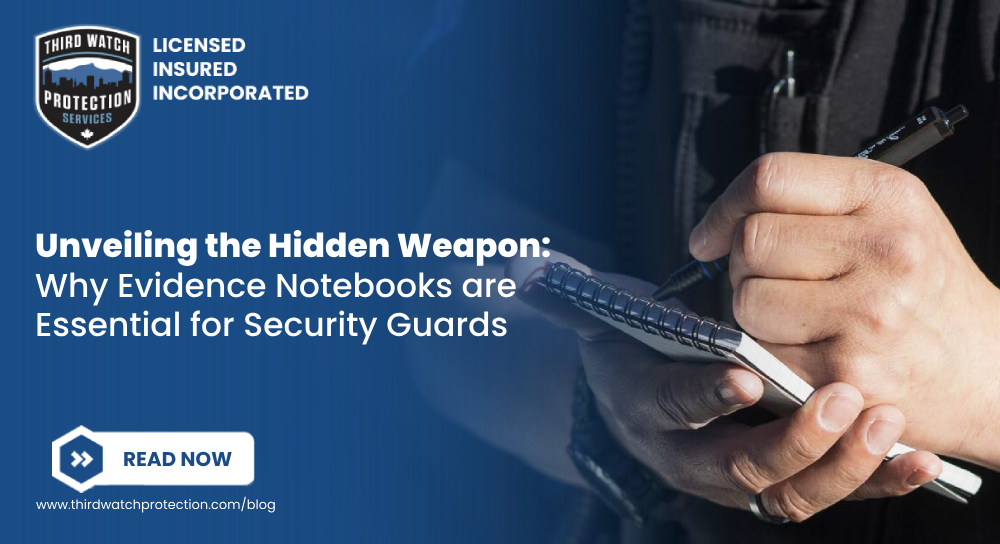Unveiling the Hidden Weapon: Why Evidence Notebooks are Essential for Security Guards
In an era where security challenges are on the rise, the tools and tactics employed by security personnel must evolve accordingly. While high-tech gadgets and surveillance equipment often grab the headlines, one of the most powerful and underestimated tools in a security guard’s arsenal is the evidence notebook. This simple tool has proven invaluable in documenting events, gathering evidence, and enhancing the professionalism of security officers. In this blog post, we will explore why evidence notebooks are essential for security guards and how they can be pivotal in the daily execution of their responsibilities.
The Importance of Documentation
A. Record Keeping: Documentation is a key component of security operations. Security guards encounter numerous situations daily, from minor incidents to significant emergencies. Each interaction or event should be documented thoroughly to ensure an accurate record of what transpired, when, and under what circumstances.
Evidence notebooks serve as a personal record that security personnel can turn to for reference. By meticulously noting details such as time, date, location, people involved, and specific actions taken, guards can create an invaluable resource. This record-keeping not only facilitates proper communication with law enforcement and stakeholders but also supports any investigations that may arise from an incident.
B. Legal Protection: In a litigious society, the risk of being held accountable for an event can loom large over security guards. To protect themselves, clear and accurate documentation is crucial. An evidence notebook can serve as a first-hand account defending the security personnel’s actions in court, should the need arise.
For instance, in cases where a security guard apprehends a suspect, the specifics recorded in an evidence notebook can provide crucial context, helping to piece together the chronology of events. This not only assists legal professionals in understanding the situation better but can also potentially exonerate the security personnel if their actions are called into question.
Enhancing Situational Awareness
A. Incident Analysis: In the world of security, every incident can serve as a learning opportunity. By documenting events in detail, security guards can identify patterns and trends over time. For example, if certain areas of a property consistently report incidents of theft or vandalism, security teams can strategize adjustments to patrol routes or increase surveillance in that area.
Analyzing these records allows management to assess what measures are effective and where improvements can be made. Over time, this leads to a more informed and proactive approach to security operations, which is ultimately beneficial for everyone involved.
B. Memory Aid: Human memory is fallible. Emotions can cloud recollections of events, leading to discrepancies in reports. Having a dedicated notebook helps security guards maintain a consistent and accurate account of what they’ve witnessed or dealt with throughout their shifts. This becomes particularly important in high-stress situations, where adrenaline may impede clear thinking.
By referring back to their evidence notebooks, security personnel can ensure that what they communicate to colleagues, clients, law enforcement, or in formal reports aligns with the documented facts, preventing misunderstandings or inconsistencies.
Improving Professionalism
A. Accountability: Carrying an evidence notebook fosters a culture of accountability among security teams. The act of documenting events encourages guards to act with integrity, knowing that their actions are being recorded and scrutinized. This can create a heightened sense of responsibility, leading to more deliberate and measured responses, particularly in critical scenarios.
B. Enhanced Communication with Stakeholders: When security guards regularly utilize evidence notebooks, they can better relay information to management, clients, or law enforcement. Clear, well-organized notes provide substantial documentation to support observations and findings. Whether it’s a report of a suspicious person, a breakdown of incident responses, or patterns of activity, improved communication leads to more effective security strategies.
In corporate environments, this also enhances trust with clients, as they can see that the security team is diligent in maintaining comprehensive records and is invested in the safety and security of the premises.
Best Practices for Using Evidence Notebooks
To maximize the effectiveness of evidence notebooks, security guards should adhere to a few best practices:
1. Be Consistent: Documentation should be a regular part of every shift. Security personnel should make it a habit to record details promptly and consistently throughout their time on duty. This ensures that even the most minor yet potentially significant incidents don’t go unrecorded.
2. Detail, Detail, Detail: When documenting incidents, it’s imperative to be comprehensive. Include the who, what, when, where, why, and how of each event. Even seemingly insignificant details—like the weather, number of people present, or the conditions at the time—can be critical in reconstructing events later.
3. Use Clear Language: The evidence notebook serves not only personal usage but may also be reviewed by others. Therefore, clarity is key. Use legible handwriting, straightforward language, and avoid jargon where possible to ensure that anyone reading the notes understands the documented events clearly.
4. Stay Professional: An evidence notebook is a formal record. Personal sentiments or informal commentary should be kept to a minimum. Maintaining a professional tone preserves the notebook’s integrity and ensures it remains a credible reference.
5. Organize Periodically: Regularly organizing entries—whether chronologically, thematically, or by location—can make it easier to access crucial information when needed. This could involve creating an index or a digital backup to ensure that relevant information can be retrieved quickly.
In Conclusion
In conclusion, evidence notebooks represent a vital tool in the professional toolkit of security guards. From offering significant legal protections to enhancing situational awareness and fostering accountability, these notebooks can dramatically improve the efficacy of security operations. It is essential for both individual guards and security organizations to recognize the value of effective documentation.
By embracing the practice of thorough note-taking, security guards can not only safeguard their own interests but also contribute to creating safer environments for the communities they serve. In the ever-evolving landscape of security threats, the humble evidence notebook just may be the hidden weapon that security personnel need to rise to the challenges of their roles.
If you are interested in the new Security provider, Third Watch Protection Services is here to help protect your property. Call us today at 1-888-444-5232 or email mail@thirdwatchprotection.com to get started!



